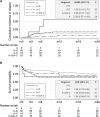Impact of Enterococcus faecalis Endocarditis Treatment on Risk of Relapse
- PMID: 36124844
- PMCID: PMC9839190
- DOI: 10.1093/cid/ciac777
Impact of Enterococcus faecalis Endocarditis Treatment on Risk of Relapse
Abstract
Background: Enterococcus faecalis infective endocarditis (EFIE) is characterized by a higher frequency of relapses than other infective endocarditis. The role of the treatment on its occurrence remains poorly understood. The aim of this study was to investigate whether the antibiotic regimen could impact the risk of relapse in EFIE.
Materials: This was a multicenter retrospective study of patients diagnosed with definite EFIE between 2015 and 2019 in 14 French hospitals. The primary endpoint was the occurrence of relapses within the year following endocarditis diagnosis. As death was a competing risk for relapse, Fine and Gray models were used for studying risk factors and impact of treatment.
Results: Of the 279 patients included, 83 (29.7%) received the amoxicillin-gentamicin (A-G) combination, 114 (40.9%) amoxicillin-ceftriaxone (A-C), 63 (22.6%) A-G and A-C (A-G/A-C) sequentially, 9 (3.2%) amoxicillin (A), and 10 received other treatments. One-year-relapse rate was 9.3% (26 patients). Relapse occurred after a median delay of 107 days from EFIE diagnosis; 6 occurred after 6 months, and 6 were diagnosed by blood cultures in asymptomatic patients. In multivariate analysis, surgery during treatment was a protective factor against one-year relapse and death.The cumulative incidence of relapse 1 year after endocarditis was 46.2% for patients treated with amoxicillin, 13.4% with A-G, 14.7% with A-C, and 4.3% with A-G/A-C (P≥.05 in multivariate analysis).
Conclusions: Relapses after treatment of EFIE are frequent, frequently asymptomatic, and may occur more than 6 months after the initial episode.
Keywords: e. faecalis; amoxicillin; drug therapy combination; endocarditis; relapse.
© The Author(s) 2022. Published by Oxford University Press on behalf of Infectious Diseases Society of America.
Figures


Comment in
-
Therapeutic Issues in Relapsing Enterococcus faecalis Endocarditis.Clin Infect Dis. 2023 Apr 17;76(8):1524-1525. doi: 10.1093/cid/ciac953. Clin Infect Dis. 2023. PMID: 36527703 No abstract available.
-
Importance of Considering Hospital-Level Variables in Multi-Institutional Studies.Clin Infect Dis. 2023 Apr 17;76(8):1523-1524. doi: 10.1093/cid/ciac954. Clin Infect Dis. 2023. PMID: 36527725 No abstract available.
References
-
- Habib G, Erba PA, Iung B, et al. Clinical presentation, aetiology and outcome of infective endocarditis. Results of the ESC-EORP EURO-ENDO (European infective endocarditis) registry: a prospective cohort study. Eur Heart J 2019; 40:3222–32. - PubMed
-
- Fernández-Hidalgo N, Escolà-Vergé L, Pericàs JM. Enterococcus faecalis endocarditis: what's next? Future Microbiol 2020; 15:349–64. - PubMed
-
- Østergaard L, Bruun NE, Voldstedlund M, et al. Prevalence of infective endocarditis in patients with positive blood cultures: a Danish nationwide study. Eur Heart J 2019; 40:3237–44. - PubMed
-
- Olmos C, Vilacosta I, Fernández-Pérez C, et al. The evolving nature of infective endocarditis in Spain: A population-based study (2003 to 2014). J Am Coll Cardiol 2017; 70:2795–804. - PubMed
-
- Escolà-Vergé L, Fernández-Hidalgo N, Larrosa MN, Fernandez-Galera R, Almirante B. Secular trends in the epidemiology and clinical characteristics of Enterococcus faecalis infective endocarditis at a referral center (2007–2018). Eur J Clin Microbiol Infect Dis 2021; 40:1137–48. - PubMed
Publication types
MeSH terms
Substances
LinkOut - more resources
Full Text Sources
Medical
Research Materials

